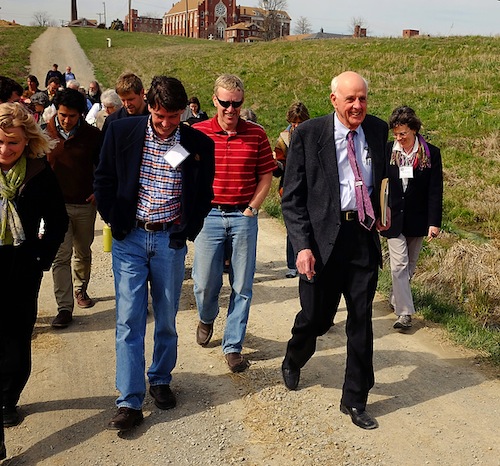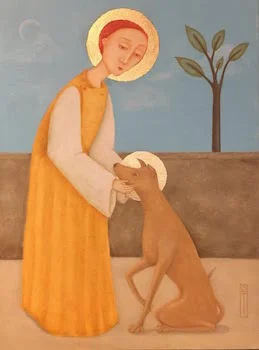 Photo by Tom Eblen
Photo by Tom Eblen
The first time I heard Wendell Berry speak was in his living room. There was no interviewer, no microphone, no podium. Just Mr. Berry in his Sunday best, Mrs. Berry beside him, and four nervous ladies (and a baby) who had driven three hours to glean inspiration from one literary hero.
Whenever I am asked what we talked about that afternoon, I have to confess that I hardly spoke. I had just finished the stunning Jayber Crow, and I had read enough of Berry’s agrarian essays to feel inadequate and uneducated. His writing is unapologetic, and because of his unyielding convictions, he can appear dogmatic. I was afraid that if I spoke, the truth would not set me free: I was a station wagon-driving, internet-addicted, (occasional, but ashamed) mall-shopping suburbanite.
I would be known and judged.
It wasn’t until the end of our meeting that I mustered enough courage to ask his opinion on big agribusiness and genetically modified food. “I’m so worried,” I said. “What do you think we should do?” Berry, contrary even to his own reputation, gave the most shocking answer I could imagine: “Do not worry about tomorrow. Today has enough troubles of its own.”
This was the man who was once arrested for peacefully protesting mountain top removal. This was the man who had written over 15 books of essays without using an electric lamp or a computer. This was the man who wrote, “I am done with apologies. If contrariness is my inheritance and my destiny, so be it” in his poem titled, “The Contrariness of the Mad Farmer.” This was Wendell Berry, and he was sitting across from me with his hands folded in his lap, calmly quoting Scripture and telling me not to worry.
It was comforting for all of the obvious reasons and discouraging because I am a broken human in a broken world longing for immediate solutions.
The second time I heard Wendell Berry speak was at the Brown Hotel along with hundreds of other conference attendees. The Berry Center hosted the conference, and the focus was “Homecoming: The Resettling of America.” The speakers included theologians, economists, biologists, farmers, and, of course, Wendell Berry.
Wendell Berry’s daughter Mary spoke first about the endangered small farm, about her own prodigal journey away from her rural Kentucky, and about her father’s forgiveness upon her return. She described her own family farm as “unbroken lines of story for eight generations.” The theme throughout the following two days was to retell the hero story as a story where we find glory and adventure by investing in our own small towns and farm communities.
During the weekend, many people asked me where I was from. To avoid being known or judged, I told them I was from “right down the road” in Tennessee. What I did not say was that I had left my own small agricultural town in rural California to pursue a music career in big-city Nashville.
I shared a table with an older man who had started various successful community gardens; Andrew Maxfield, who had spent seven years setting Berry’s poetry to music; and a woman who, just like me, had come to learn and to be inspired.
Many of the attendees were Kentucky farmers seeking answers in the midst of the struggle to stay afloat. During panel discussions, the questions raised by the experts ranged from philosophical to pragmatic:
“What would I like my grandchildren to come away with?”
—Wes Jackson, founder of The Land Institute
“Why does the Bible always get it right when it comes to land?”
—Duke Divinity professor Ellen Davis in regard to creation care and land use
“What if we spent 15% of our money within 15 miles?”
—Woody Tasch of Slow Money
“How do we change things now?”
—Fred Kirshenmann, author and scholar
Much like the Sunday afternoon I spent at Berry’s farmhouse, I was anxious and hoping for some practical advice. How exactly do we resettle America? How do we fix our declining economy, our broken food system, or our endangered environment?
The end of the conference brought the event we’d all been anticipating: Bill Moyers’ interview with Wendell Berry in the beautiful Dominican chapel of St. Catherine’s College. I opened my notebook and began to scribble quickly, careful not to miss the answer all of us had been waiting for.
However, when asked specifically for a solution for the future, Mr. Berry spoke the very words he had spoken upon our first meeting, and suddenly we were all sitting in his living room having that same conversation: “You can’t worry about tomorrow. I don’t like to talk about the future very much because it doesn’t exist.”
My journal from the conference contains nearly 50 pages of handwritten notes documenting climate change statistics, a brief history of GMOs, confusing economic figures, and one line that tells me all I need to know: “Do what is right today.”
Today, I imagine what that looks like for me.
I probably won’t take down big agribusiness singlehandedly, but I can plant a seed in my backyard. It is true that I left a small town for the opportunities of a bigger city, but I can foster community among the friends I have grown to love and care for here.
Today, I live in the heart of East Nashville; tomorrow, my husband and I long for a house on 20 acres with goats, chickens, and a great Pyrenees. Today, we acknowledge the harsh realities of life as modern American farmers. Tomorrow, we hope we are up to the challenge. Today, we read, we plot, and we plan. Tomorrow is not ours.
As Wendell Berry says, “Tomorrow doesn’t exist.”
There are endless opportunities to worry and to dream about tomorrow, but I want to remember what God has called me to today: “He’s already made it plain how to live, what to do, what God is looking for in men and women. It’s quite simple: Do what is fair and just to your neighbor, be compassionate and loyal in your love, And don’t take yourself too seriously — take God seriously” (Micah 6:8, The Message).
There is one tomorrow we can be sure of: Our Father in heaven will not wait for our prodigal return, but rather, He will bring the Kingdom home to us. It will be the ultimate Homecoming, and he won’t just resettle the broken land, he will restore our broken hearts. We will see not eight generations, but an eternity of unbroken story. And yes, we will be known, but we will be judged as sons and daughters and heirs with Christ.
As I let go of my own fears and anxieties, I imagine the One who knows our hearts will stand and say, “Yesterday had enough troubles of its own. Do not worry anymore.”
Flo Paris Oakes is a musician and a writer whose passions include good food (both eating and making), literature, creation care, and especially the convergence of all three. Flo is currently studying English and Sustainability at Lipscomb University and is also busy writing and recording songs for children with Rain for Roots. Flo lives with her husband, two daughters, and five chickens in East Nashville, TN.















